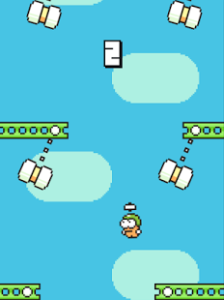Building an application for smartphones is a lot like constructing a house. It requires meticulous research & planning, time, energy, and resources. But what if someone else builds a near-identical version of the perfect house you envisioned, undercuts the price, and puts it up for sale right next to your lot? Sadly, unless you are prepared to invest as much into removing the copy cats as you did in developing your unique application, not much can be done about it. Welcome to the reality of the app store.
Take Swing Copters for example, a game which came out just a short while ago for iOS and Android. Not only was it marred with knock-offs that went so far as to plagiarize the title itself, but many of the clones were freely available before the original game was officially published. With the advantage of being first on the market lost to the hundreds (yes hundreds) of clones, the app could very easily have fallen into the abyss that is the App/Play Store. You may have noticed that I used the past-tense; if you did, cookies for you. The reason being is that Swing Copters, with all the problems that plagued it’s release, also happens to be a rare exception to the Wild West nature of the app stores.
Both Apple and Google showed some initiative by purging the Swing Copters wanna be’s from their respective stores, but the direction was a purely reactive – as opposed to the desired proactive – approach. What makes Swing Copters so special is that it happens to be developed by the same person who created the ultra-famous (or infamous depending on how much you’ve read about it online) game Flappy Bird. The resulting media backlash illustrating the lack of control on the app stores was sufficient to force the two major conglomerates to ‘refresh’ the app catalogue, but not convincingly enough for either companies to commit in improving the submission & filtering process. Until such a time comes, the general developer populous is left to fend for themselves, so here are some tips to help protect your app ideas:
1) Have an idea that is difficult to imitate. Be mindful that difficulty is not directly proportional to the time spent in creating an application. It can take the original inventor months or even years to perfect the mechanics of an application with comprehensive testing, user studies, and other things that an imitator does not have to concern themselves with.
2) Keep your cards close. It’s always fun bragging about an idea until someone steals it, and such was the case with Swing Copters when developer Dong Nguyen posted a video demonstrating the gameplay. This isn’t to say that nothing should be made public until the application has been published, but there needs to be a balance between how much you want to show off vs how much harm can be incurred by this kind of exposure.
3) Be mindful of your competition. It’s near-impossible to come up with an idea without having it being compared to something else, but that’s ok. Companies like 3M prides itself in innovating existing products and the same can be said about improving an existing application. The key word here being “improving”, that is, providing a reason why your product is comparatively better in some regard and consistently stay ahead of the competition by iterating on that unique take.
4) Have a solid marketing strategy. A product is only visible on the market if people know about it. This seems like an obvious point but is something that I personally believe a lot of people don’t focus enough on. You can have an amazing app on the store but if it doesn’t stand out in a search result, it can end up staying hidden to the potential consumers indefinitely. Not only is it financially stifling, but gives someone else the opportunity to recreate the idea and claim it is as their own.


The makers of Triple Town (pictured left) had filed a lawsuit against the makers of Yeti Town (pictured right) which resulted in an out-of-court settlement.


